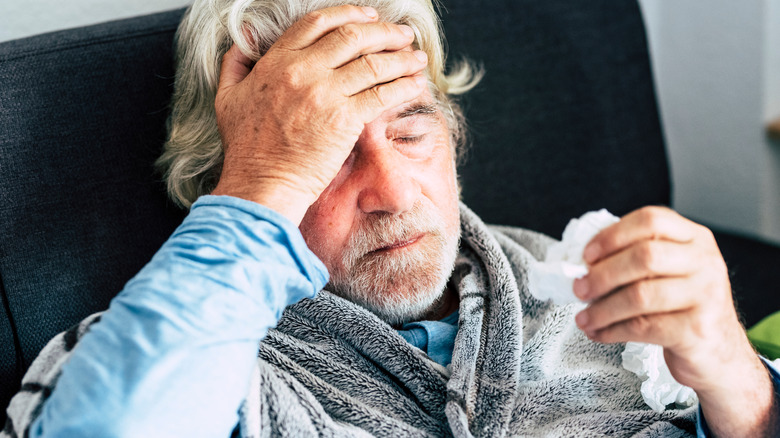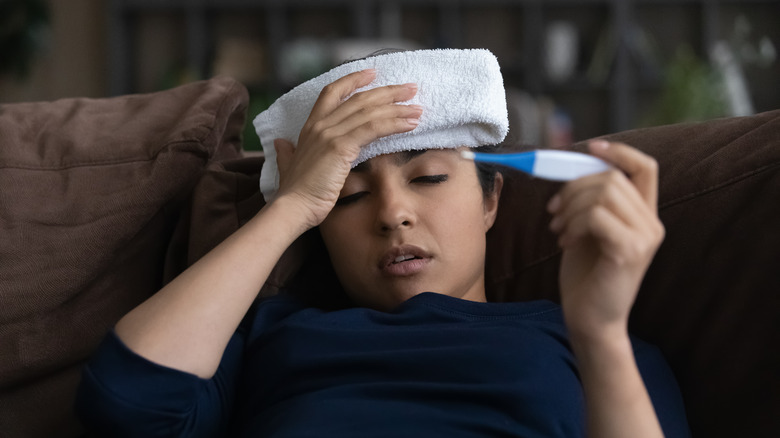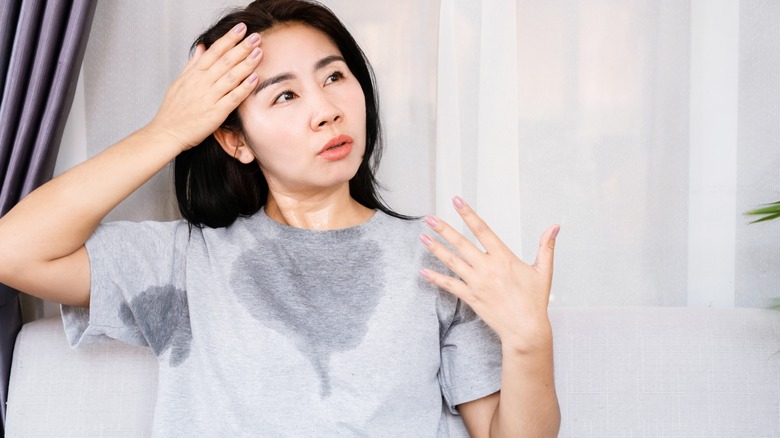Is Sweating Out A Fever Actually Safe?
Seeing an elevated temperature on a thermometer can be alarming. You may start worrying about whether you need to call the doctor, or if you can just sweat it out a home. The answer, like most things, is a little more complicated than a simple yes.
A fever is any temperature reading of 100.4 degrees or higher, according to Healthline. The good news is that rarely is fever itself something that needs to be treated. A fever is not a condition in and of itself; it's usually a symptom that your immune system has fired up to fight off an infection. Occasionally, fevers can also be caused by heat exhaustion, inflammatory diseases, medications, and some vaccinations, according to the Mayo Clinic. If a fever reaches 103 degrees, it is considered an emergency and requires medical attention.
Bacteria and viruses survive well at our standard human body temperature, around 98.6 degrees, according to Health. To rid the body of these invaders, the hypothalamus portion of our brain will increase body temperature, creating an inhospitable environment.
Side effects of sweating out a fever
Some people believe that bundling up in layers or exercising to induce sweating will help rid the body of a fever. The theory is that a virus or bacterial infection will be expelled through sweat, family medicine doctor Tina Ardon told Prevention. However, there's no evidence that it actually works, and it could even have some unwanted side effects.
According to Mayo Clinic, fevers usually dehydrate the body, and sweating increases the likelihood of further dehydration. Whether you decide to turn your room into a sauna or not, be sure you're taking in lots of liquids. And if you do decide to exercise, be aware that you're more likely to exacerbate your illness, as seen in a 2014 study on athletes published in the journal Sports Health. The body is already working overtime to rid itself of bacteria or viruses, so exhausting it may just slow that process.
What actually works to break a fever?
Instead of working up a sweat to fight a fever, a better option is to make yourself as comfortable as possible. If you feel chills, bundle up in blankets until they pass, recommends Cleveland Clinic. If you're overheated, try a lukewarm shower or cold compress on your neck or forehead.
Also, take this opportunity to give your body all the rest it wants while it works hard to bring you back to health. You may need to take the day off from work or school while you rest in bed or on the sofa. It's also important to replenish the body with plenty of water and electrolyte-rich drinks.
Medical News Today also notes that over-the-counter medications like aspirin and ibuprofen can be effective in bringing down a high temperature. However, it's important to not use these medicines only for the purpose of rushing back to regular activities. Even if medication temporarily relieves a fever, that doesn't mean your body is strong enough yet to carry on as usual. Additionally, you may still be contagious, so it's best to continue resting at home until your fever passes on its own.
When to see a doctor for a fever
Fevers are often a normal part of fighting off an illness, but there are times when a high temperature warrants a trip to the doctor's office. Adults should seek medical care if a fever is accompanied by a severe headache, stiff neck, rash, abdominal pain or vomiting, confusion, seizure, or any other new or unusual symptoms, per Mayo Clinic.
For children, see a doctor if the child is irritable, confused, unable to maintain eye contact, vomiting repeatedly, or complaining of aches. Additionally, contact a medical professional if the child has a fever after being exposed to extreme heat (such as from being in a hot car) or if they have a seizure.
Infants and small children should always be seen by a doctor when experiencing a high temperature. According to Mayo Clinic, this includes a fever of at least 100.4 degrees in children younger than three months and 102 degrees in children between three and 24 months.
Dr. Lisa Bernstein, a medical doctor and Assistant Professor of Medicine at Emory University, told ABC News that for adults and older children, a fever without severe symptoms isn't usually a cause for concern. But if body temperature spikes for more than a couple of days, see a doctor to check for a possible infection or other health condition.
What if you're still sweating after a fever is gone?
While it may not be a good idea to force yourself to sweat in the hopes of overcoming an illness, fevers can commonly cause sweating anyway as the body works hard to fight off infections (per Healthline). Some people also notice night sweats, a common symptom of illnesses like the flu and colds (per Cleveland Clinic). Whether sweating occurs during the day, at night, or around the clock, it usually resolves on its own once the fever passes.
Sometimes, however, sweating may linger even after a fever — and its related illness — is gone. Healthline explains that this could be a sign that your body isn't yet ready for the amount of physical activity you've taken on after being sick.
However, other factors could also explain perspiration. According to WebMD, sweat is caused by stress and anxiety, certain medications, spicy foods, hot and/or caffeinated drinks, and hormonal changes (such as those related to menopause and pregnancy). Some health conditions may also trigger excessive sweating.
If sweating continues days after your fever has subsided, talk to your doctor.





